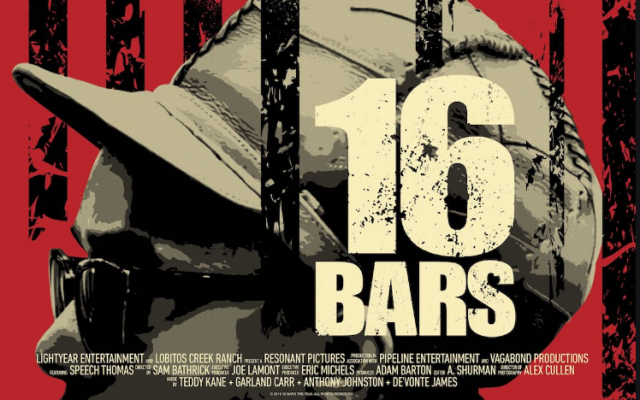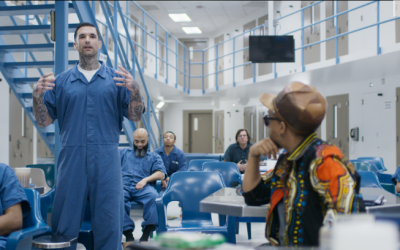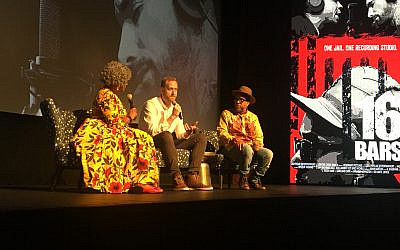Human Cost of Imprisonment Examined in ‘16 Bars’
Sam Bathrick’s new documentary, “16 Bars,” asks some serious questions about incarceration and the criminal justice system in America.

As a teenager in Atlanta’s Jewish community, Sam Bathrick found himself often thinking and talking about issues of social justice. His parents Jesse and Richard Bathrick were community activists who were frequently on the front lines of one issue or another, and the family were early members of Congregation Bet Haverim, a synagogue where social justice is a common concern.
“Growing up I was definitely influenced by activism and social justice,” Sam Bathrick said. “But it wasn’t so much about marching and protesting in the streets, it had more to do with being curious and asking questions. I learned early not to take things at face value.”
So it was only natural that Bathrick’s new documentary, “16 Bars,” which had its Atlanta premiere earlier this month, asks some serious questions, in this case about incarceration and the criminal justice system in America.
The film is set in Richmond, Va., which features an imposing statue of Robert E. Lee on horseback. But in a graceful aerial shot that opens the film, Lee and his horse quickly give way to another impressive structure, the Richmond City Justice Center. It’s a monumental architectural award winner, built four years ago at a cost of almost $125 million as a short-term holding facility for prisoners moving through the criminal justice system.
In one corner of this 400,000-square-foot building is a makeshift recording studio where prisoners can explore their musical talent before moving on to a more permanent prison or to be released into the outside world.
The film “16 Bars” looks at the story of four men at various stages of incarceration, largely through the vehicle of the music they create at the studio over a two-week period.
Their mentor and musical producer is Todd “Speech” Thomas, who is the lead vocalist of the legendary Atlanta hip-hop group Arrested Development. The success of the Grammy Award-winning group in the early 1990s was partly responsible for helping to put this city on America’s popular music map.
Thomas’ thoughtful and articulate presence at the heart of the documentary helps to illuminate this rare glimpse at the personal cost of America’s massive prison system. In buildings like the one in Richmond our nation locks up more of its citizens, per capita, than any other country in the world, according to the U.S. Bureau of Justice Statistics.
Bathrick calls our attention to this fact in starkly human terms, without resorting to expert commentary or statistics, impressive as they are.
“We’ve tried to communicate in the film how many of these people are in prison,” he says, “that we are not hearing from and are really not a part of this conversation that is happening around criminal justice reform and mass incarceration”
The four prisoners who are profiled, three of whom are black and one white, are impressive musical performers who are deciding how to deal with a future that holds few options for them.

Many prisoners who are released face difficult decisions in a society that does not look kindly on individuals with a criminal record. Often, when they are unable to find employment or social acceptance, they return to a life of crime.
The film, which was screened under the sponsorship of the National Center for Civil and Human Rights in Atlanta, explores the very real problem of recidivism, which is a kind of revolving door syndrome that affects many who have run afoul of the criminal justice system. Often the failure to find a place in society can lead to another lengthy jail term.
Bathrick wants the film to start a conversation about how to better deal with recidivism.
“The goal of this film is ultimately to explore what leads people to jail and what makes it so hard for them to re-enter society,” he said.
The film is scheduled for a national release beginning Nov. 8, with sales of a CD of the soundtrack to begin on the same day. But in the meantime, the documentary is being made available for showings in youth detention centers and Scared Straight crime prevention programs. It was shown at a meeting of the National Association of Criminal Defense Lawyers and at Harvard University and has had a warm reception at film festivals around the country.

Part of the goal of the film is to reach young people before they make their first, life-altering mistake.
“What we want to do,” Bathrick concludes, “is show what recidivism really means, the idea that once you are in the criminal justice system it’s very hard to get out. Once you have a record, it can quickly pile up on you.”



comments